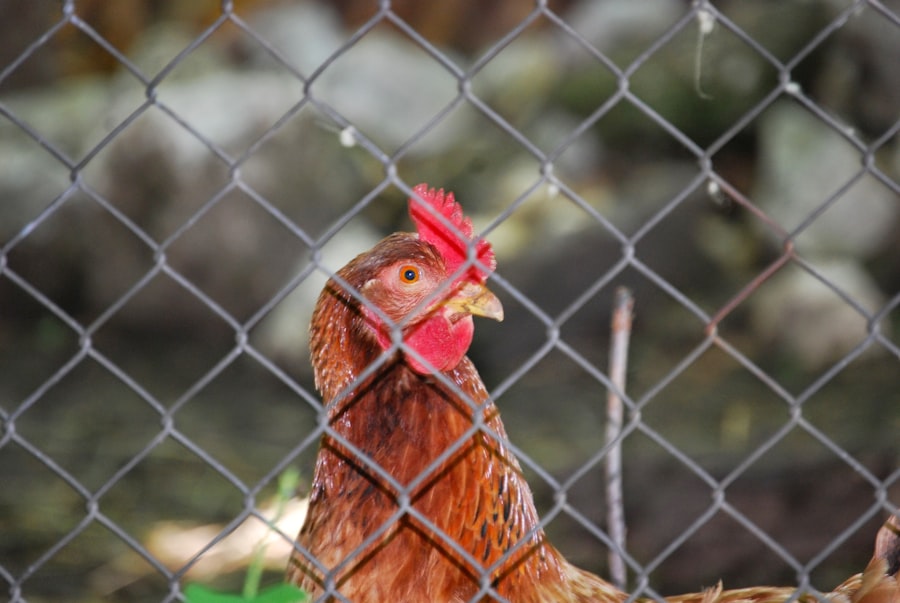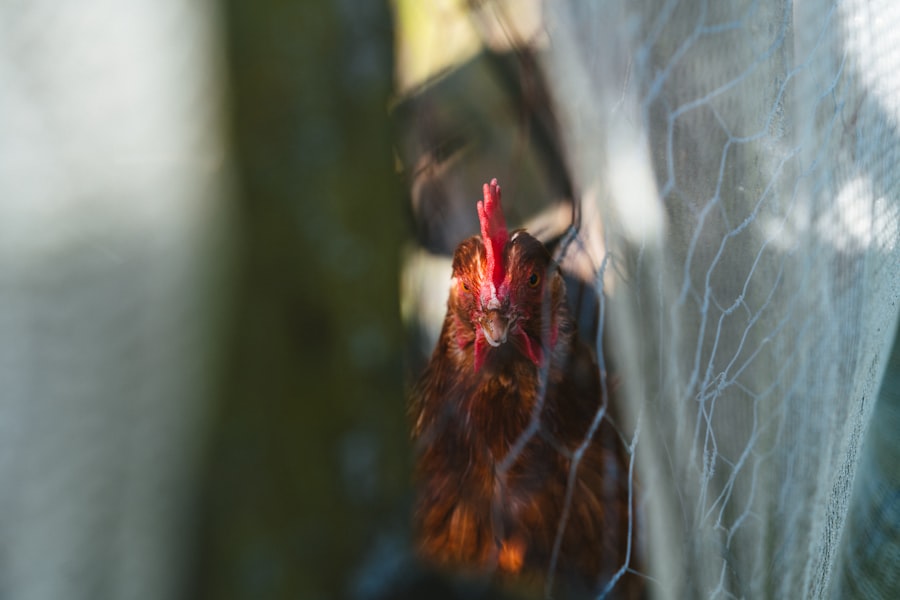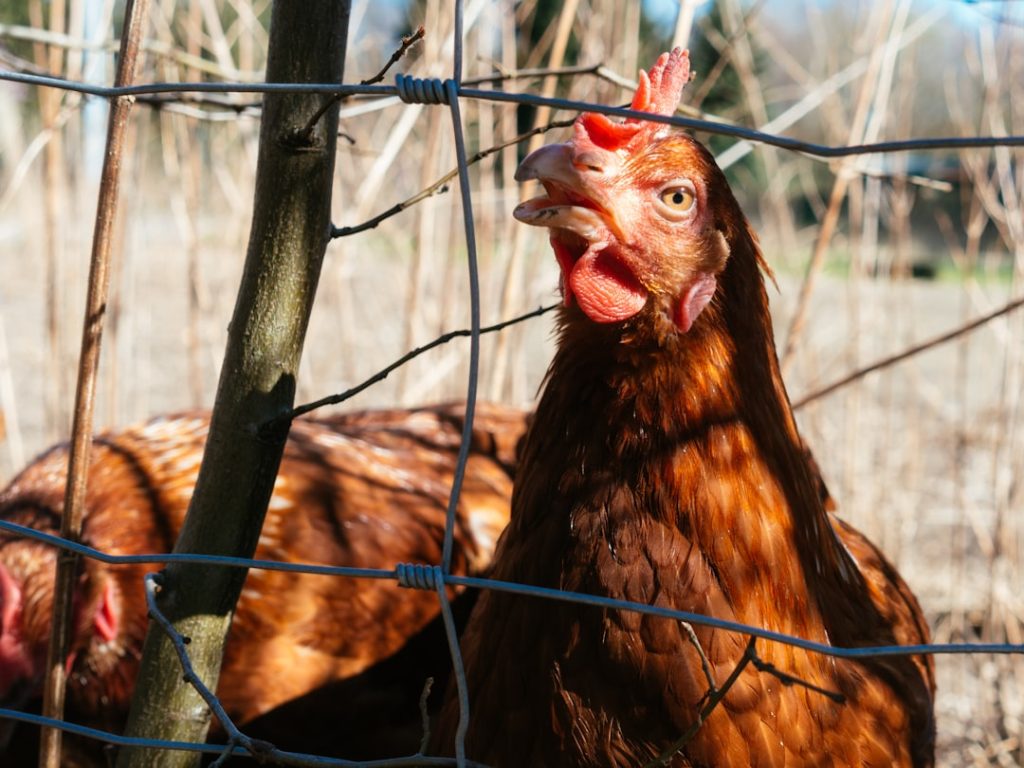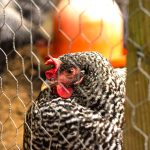Chickens are naturally curious and foraging animals that can cause damage to gardens if allowed to roam freely. Their behavior is characterized by scratching and pecking at the ground in search of food, which can uproot plants and damage soil. Chickens are particularly attracted to leafy greens and fruits, making them a concern for gardeners.
As social animals, chickens tend to follow each other, meaning that if one finds a way into the garden, others are likely to follow. Chickens are creatures of habit and will return to areas where they have previously found food or shelter. Once they discover a garden as a potential food source, they are likely to continue returning unless deterred.
This behavior necessitates the implementation of long-term strategies to keep chickens out of gardens and protect plants. Understanding these natural behaviors is crucial for gardeners to develop effective solutions that address the underlying reasons why chickens are drawn to gardens. By anticipating and preventing potential damage, gardeners can better protect their plants and maintain their gardens while coexisting with chickens.
Table of Contents
- 1 Implementing physical barriers to protect the garden
- 2 Providing alternative areas for the chickens to forage
- 3 Using natural deterrents to keep chickens away from the garden
- 4 Training chickens to stay out of the garden
- 5 Monitoring and reinforcing boundaries
- 6 Seeking professional advice for persistent issues
- 7 FAQs
- 7.1 What are some effective ways to keep chickens from ruining my garden?
- 7.2 What types of fencing or barriers can I use to keep chickens out of my garden?
- 7.3 How can I create designated areas for my chickens to roam to prevent them from ruining my garden?
- 7.4 What are some alternative sources of entertainment and food I can provide for my chickens to keep them away from my garden?
Key Takeaways
- Chickens are naturally curious and will forage in the garden if given the opportunity
- Physical barriers such as fences and netting can effectively protect the garden from chicken intrusion
- Creating designated foraging areas with plants and insects can divert chickens away from the garden
- Natural deterrents like citrus peels, coffee grounds, and vinegar can discourage chickens from entering the garden
- Training chickens with positive reinforcement and consistent boundaries can help them stay out of the garden
Implementing physical barriers to protect the garden
Physical Barriers: A Simple Solution
One effective way to keep chickens out of the garden is by implementing physical barriers. This can include installing fences or netting around the perimeter of the garden to prevent chickens from gaining access. Fences should be at least 6 feet high to prevent chickens from flying over them, and the bottom should be buried or secured to the ground to prevent chickens from digging underneath.
Netting: An Additional Layer of Protection
Additionally, netting can be used to cover individual plants or entire garden beds to protect them from being pecked at by chickens. These physical barriers not only prevent chickens from entering the garden but also serve as a visual deterrent, signaling to the chickens that the garden is off-limits.
Designated Chicken-Free Zones
Another option for physical barriers is to create a designated chicken-free zone within the garden by using raised beds or containers. This can help protect vulnerable plants while still allowing chickens to roam freely in other areas of the yard. By creating physical barriers, gardeners can effectively protect their plants from damage caused by chickens while still allowing the chickens to have access to other parts of the yard.
Establishing Clear Boundaries
These barriers not only serve as a practical solution but also provide a clear boundary for both chickens and gardeners, helping to establish a clear understanding of where the chickens are allowed to roam.
Providing alternative areas for the chickens to forage

In addition to implementing physical barriers, providing alternative areas for the chickens to forage can help redirect their attention away from the garden. This can include creating a designated foraging area with loose soil or mulch where chickens can scratch and peck without causing damage to plants. By providing an alternative space for the chickens to satisfy their natural foraging instincts, gardeners can help minimize their impact on the garden.
Additionally, offering supplemental food and treats in this designated area can further encourage the chickens to spend their time away from the garden. Another option is to create a separate chicken run or enclosure where the chickens can safely roam without having access to the garden. This can be achieved by using fencing or netting to create a secure area for the chickens to explore while preventing them from entering the garden.
By providing alternative areas for the chickens to forage, gardeners can help minimize their impact on the garden while still allowing them to engage in natural behaviors. This not only benefits the garden but also provides enrichment for the chickens, creating a win-win solution for both parties.
Using natural deterrents to keep chickens away from the garden
Natural deterrents can be an effective way to keep chickens out of the garden without causing harm to the animals. One common natural deterrent is the use of strong-smelling herbs and plants, such as lavender, mint, or rosemary, which are known to repel chickens. These can be planted around the perimeter of the garden or interplanted with vulnerable crops to create a natural barrier that deters chickens from entering.
Additionally, scattering citrus peels or coffee grounds around the garden can also help deter chickens due to their strong scent. Another natural deterrent is the use of motion-activated sprinklers or noise-making devices that startle and deter chickens when they approach the garden. These devices can be strategically placed around the perimeter of the garden and set to activate when they detect movement, effectively discouraging chickens from entering.
By using natural deterrents, gardeners can keep chickens out of the garden without resorting to harmful chemicals or methods that could potentially harm the animals.
Training chickens to stay out of the garden
Training chickens to stay out of the garden can be a long-term solution that benefits both the garden and the chickens themselves. One method of training is through positive reinforcement, such as rewarding chickens with treats when they stay out of the garden or follow commands to return to their designated areas. By consistently rewarding desired behaviors, such as staying within designated boundaries, chickens can learn to associate staying out of the garden with positive outcomes.
Another training method is through negative reinforcement, such as using a gentle spray of water or a noise-making device when chickens attempt to enter the garden. This helps create an aversive association with entering the garden, encouraging them to stay away in order to avoid discomfort. By training chickens to stay out of the garden through positive and negative reinforcement, gardeners can establish clear boundaries and expectations for their behavior while promoting a harmonious coexistence between chickens and gardens.
Monitoring and reinforcing boundaries

Regular Inspection and Maintenance
Once physical barriers and deterrents have been implemented, it is essential to consistently monitor and reinforce boundaries to ensure their effectiveness. This involves regularly inspecting fences and netting for any signs of damage or wear and tear that could potentially allow chickens to gain access.
Replenishing Natural Deterrents
Additionally, it is crucial to replenish natural deterrents, such as strong-smelling herbs or citrus peels, as their effectiveness may diminish over time.
Consistent Reinforcement of Training Methods
Furthermore, consistent reinforcement of training methods is vital in maintaining boundaries and expectations for chicken behavior. This can involve regularly rewarding desired behaviors and using aversive techniques when necessary to remind chickens of where they are allowed to roam.
By monitoring and reinforcing boundaries, gardeners can ensure that their efforts to keep chickens out of the garden remain effective in the long term.
Seeking professional advice for persistent issues
In some cases, persistent issues with keeping chickens out of the garden may require professional advice or assistance. This can include consulting with a veterinarian or animal behaviorist who specializes in poultry behavior to gain insights into effective strategies for managing chicken behavior in a garden setting. Additionally, seeking advice from experienced chicken keepers or joining local poultry groups can provide valuable tips and support from those who have successfully navigated similar challenges.
Furthermore, professional assistance may be necessary if there are underlying issues contributing to persistent chicken behavior in the garden, such as inadequate housing or lack of enrichment for the chickens. By seeking professional advice, gardeners can gain a deeper understanding of chicken behavior and receive tailored recommendations for addressing specific challenges in keeping them out of the garden. In conclusion, understanding chicken behavior in a garden setting is crucial in developing effective strategies for keeping them out while still allowing them to roam freely in other areas of the yard.
Implementing physical barriers, providing alternative foraging areas, using natural deterrents, training chickens, monitoring boundaries, and seeking professional advice are all important steps in managing chicken behavior in a way that protects both gardens and chickens. By taking a proactive approach and considering the natural behaviors of chickens, gardeners can create a harmonious environment where both plants and poultry can thrive together.
If you’re struggling to keep your chickens from ruining your garden, you may want to consider building an A-frame chicken coop. This type of coop not only provides a safe and secure space for your chickens, but it also helps to keep them contained and away from your garden. For more information on how to build an A-frame chicken coop, check out this helpful article here.
FAQs
What are some effective ways to keep chickens from ruining my garden?
Some effective ways to keep chickens from ruining your garden include using fencing or barriers to keep them out, creating designated areas for the chickens to roam, and providing them with alternative sources of entertainment and food.
What types of fencing or barriers can I use to keep chickens out of my garden?
You can use chicken wire, hardware cloth, or electric fencing to create barriers around your garden to keep chickens out. Make sure the fencing is tall enough and buried deep enough to prevent the chickens from digging under it.
How can I create designated areas for my chickens to roam to prevent them from ruining my garden?
You can create designated areas for your chickens to roam by using chicken tractors, movable fencing, or by allowing them to free-range in a specific area away from your garden.
What are some alternative sources of entertainment and food I can provide for my chickens to keep them away from my garden?
You can provide your chickens with toys, perches, and dust bathing areas to keep them entertained. Additionally, you can provide them with a variety of vegetation, insects, and other natural food sources to keep them occupied and less likely to venture into your garden.
Meet Walter, the feathered-friend fanatic of Florida! Nestled in the sunshine state, Walter struts through life with his feathered companions, clucking his way to happiness. With a coop that’s fancier than a five-star hotel, he’s the Don Juan of the chicken world. When he’s not teaching his hens to do the cha-cha, you’ll find him in a heated debate with his prized rooster, Sir Clucks-a-Lot. Walter’s poultry passion is no yolk; he’s the sunny-side-up guy you never knew you needed in your flock of friends!







